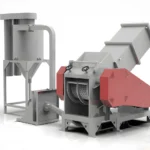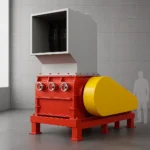As the demand for recycled plastics grows, the need for efficient and reliable processing solutions becomes increasingly crucial. At the heart of this process is the plastic granulator – an essential machine that converts plastic waste into reusable materials. Whether you aim to enhance your recycling efficiency or produce high-quality pellets for resale, choosing the ideal granulator can significantly impact your business operations and profitability. This guide is designed to assist you in navigating the essential factors when selecting a plastic granulator for your company. From understanding capacity and material compatibility to evaluating energy efficiency and maintenance needs, we cover the critical elements you should consider before making this important investment. Let's discover how to find the perfect match for your enterprise. Know Your Options: Types of Plastic Granulators.
Let's first acquaint ourselves with the common types of granulators available. They generally differ in design and function:.
Single-shaft granulators:
These are the workhorses of the industry, renowned for their versatility. A single rotating shaft with blades cuts plastic materials into smaller particles. They are ideal for medium to large volumes of general plastic waste, often used in recycling and production environments.
- Double-shaft granulators: For higher processing power required for diverse or tougher plastics, double-shaft granulators are an excellent choice. Their two interlocking shafts provide a more even cut and can handle larger or abrasive materials. They excel in applications with high throughput capacity and when processing thicker plastic materials.
- Dubbelassige granulatoren: Als u meer verwerkingskracht nodig heeft voor diverse of taaiere kunststoffen, zijn dubbelassige granulatoren een uitstekende keuze. Hun twee in elkaar grijpende assen zorgen voor een gelijkmatigere snede en kunnen grotere of schurendere materialen aan. Ze blinken uit in toepassingen met hoge doorvoercapaciteit en bij het verwerken van dikkere kunststofmaterialen.
- Heavy-duty granulators: Built to tackle industrial challenges, heavy-duty granulators handle large volumes of tough plastics, such as those from car wrecks or electronic waste. Equipped with powerful motors and robust cutting mechanisms, they ensure durability and consistent performance under harsh conditions.
Define Your Processing Requirements
Not all granulators are the same. Understanding your specific needs is crucial for making the right choice. Ask yourself the following questions:
- What specific plastic materials will you be processing? Some granulators are better suited to certain plastics (such as PET, HDPE, or PVC) than others. Choose a machine that is compatible with your primary materials to ensure efficiency and minimize wear on blades and motors.
- What final particle size do you require? The desired size of the resulting granules or flakes influences your choice. Finer materials may require granulators equipped with specific screen meshes.
- What is your required throughput capacity? Consider the scale of your operations. The capacity of a granulator is generally expressed in kilograms or tons per hour. Make sure the machine can comfortably handle your expected volume, from smaller units (e.g., 100 kg/hour) to large industrial powerhouses (multiple tons per hour).
Consider Energy Efficiency
In the current operational landscape, energy consumption is a significant consideration. An energy-efficient granulator can significantly reduce operational costs and support your sustainability goals.
- Motor Efficiency: Look for granulators with high-efficiency motors (e.g., IE3 or IE4 classifications), particularly for large-scale operations. These provide maximum power with minimal energy loss.
- Frequency Converters (VSDs): Some models are equipped with VSDs, allowing you to adjust the processing speed based on the material. This flexibility optimizes energy consumption and can improve throughput for specific applications.
Evaluate Maintenance and Durability
A plastic granulator is a significant investment; proactive maintenance is essential to protect it and ensure operational continuity. Consider:
- Maintenance Ease: Choose a machine designed for user-friendliness. Features such as easy access to the grinding chamber, simple blade replacement, and clear maintenance instructions save time and effort.
- Durability of Components: Minimize downtime and repair costs by choosing a granulator designed for long-lasting performance. Look for high-quality, wear-resistant blades, robust motors and gearboxes, and a sturdy frame made from durable materials that can withstand continuous use.
Consider the operational environment: Noise and Vibration Control
Granulators, especially high-capacity models, can generate significant noise and vibration. If your facility has noise restrictions or if you prioritize the comfort of your staff, this is an important factor to consider.
- Noise-reducing features: Some granulators incorporate noise-reducing technology, such as soundproof enclosures or specialized mill chamber designs, for quieter operation.
- Vibration isolation: Machines equipped with vibration isolation supports minimize vibrations transferred to the floor, reducing wear on the machine and improving the work environment.
Look beyond the machine: Evaluate the support and service of the supplier
Choosing a granulator also means choosing a long-term partner. Reliable support is crucial for smooth operation of your equipment. Evaluate potential suppliers based on:
- Training: Does the supplier offer comprehensive training to your team on safe and efficient operation and basic maintenance?
- Availability of spare parts: Ensure that essential replacement parts and consumables (such as blades and screens) are readily available to minimize potential downtime.
- Responsive customer service: A reliable technical support team that can quickly assist with problem-solving or maintenance inquiries is invaluable. Investigate the supplier's reputation and service network.
Beyond the price tag: Evaluation of the total cost of ownership (TCO)
While the initial purchase price is important, it is only a part of the story. Consider the Total Cost of Ownership (TCO):
- Initial investment: Compare acquisition costs with the offered features and capabilities.
- Operational costs: Take into account energy consumption, routine maintenance, and potential needs such as specific lubricants or cooling systems.
- Life span and reliability: A more durable and higher-quality granulator may have higher initial costs, but it often proves more cost-effective in the long run due to less frequent repairs and a longer operational life.
Making the right choice
Selecting the ideal plastic granulator requires a balance between your specific needs, budget, and long-term goals. Prioritize the factors most crucial to your business success. Remember that a wise investment in a reliable, efficient, and sustainable granulator will pay off for years in terms of productivity, quality, and cost savings.
By carefully considering these guidelines, you can confidently choose the plastic granulator that best suits your company's requirements and position yourself for operational success.
Conclusion
Investing in the right plastic granulator can transform your recycling process, significantly increase productivity, and ensure a high-quality, valuable output. By meticulously evaluating factors such as material compatibility, capacity requirements, energy efficiency, maintenance needs, and supplier support, you are well-equipped to make an informed, strategic purchase.
Ready to optimize your plastic processing? Choosing the right granulator is your first, crucial step towards greater efficiency and success!


 PVC Window & Door Profile Granulator | uPVC Profile Breaker for Recycling
PVC Window & Door Profile Granulator | uPVC Profile Breaker for Recycling Granulators for Hard Plastics
Granulators for Hard Plastics